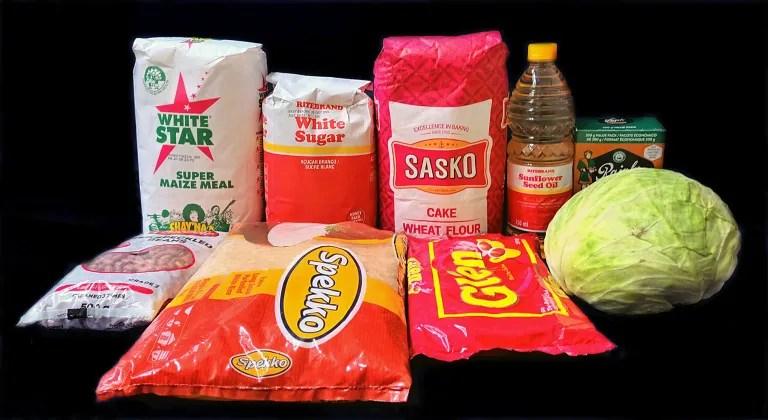Daily Maverick has been tracking the prices of 14 food items since 2022 in a simulation of what a person who receives only the R370 Social Relief of Distress (SRD) grant as an income can purchase.
Mealie meal, rice, tea and curry powder prices each decreased by more than R10 from the end of July, while the rest of the basket remained much the same. The combined price of all the products in the basket decreased to under R400 for the first time in months.
The annual inflation rate for food and non-alcoholic beverages was 4.5% in July, down from 4.6% in June, according to the Bureau for Food and Agricultural Policy’s latest Food Inflation Brief, released on Tuesday, 27 August.
Food inflation declined throughout 2024 after reaching a high of 9% in November. It’s currently at its lowest level since September 2020, when it was 3.8%.
The Food Inflation Brief credited the steady decline to “agricultural commodity price movements, as well as the appreciation in the value of the rand in recent weeks, another expected decline in fuel prices and generally weak consumer demand”, saying “food inflation is not expected to increase in the near term”.
Stats SA’s July 2024 Consumer Price Index showed that while overall food inflation had slowed, bread and cereal prices had increased.
“The category recorded an annual increase of 5.6% in July, up from June’s 5.2%. Products with the largest annual increases in July include rice (up 21.3%), pizza or pies (up 11.6%) and samp (up 6.9%). Maize meal prices rose on average by 5.1%. On a positive note, bread flour, cake flour, pasta and macaroni are cheaper than a year ago,” according to the index.
Meat is the most heavily weighed food group in the inflation basket, constituting just over a third of household spending on food. The meat price declined by 0.4% on a monthly basis and rose by 1.0% on an annual basis, the index reported.
The price index for the hot beverages category increased sharply by 17.6% in the 12 months to July, up from 16.5% in June, with instant coffee increasing by 21.8% annually.
The Pietermaritzburg Economic Justice and Dignity (PMBEJD) group’s August Household Affordability Index, released on Wednesday, found that its monthly food basket of 44 goods was not affordable for many South Africans.
In August, the average cost of its household food basket is R5,227.14. Month-on-month, the average cost of the basket decreased by R25.01 (-0.5%), from R5,252.15 in July to R5,227.14 in August. Year-on-year, the average cost of the basket increased by R102.80 (2%), from R5,124.34 in August 2023 to R5,227.14 in August 2024.
Unaffordable at minimum wage
The PMBEJD also measures a bare necessities basket that simulates what people usually choose from the 44 basic goods to survive the month.
The report concluded that the National Minimum Wage was not enough to feed the average South African family of four people.
“The National Minimum Wage is R27.58 an hour and R220.64 for an eight-hour day. In August 2024, with 21 working days, the maximum National Minimum Wage for a general worker was R4,633.44. The wage workers earn is not just to sustain themselves alone, it is used to support the entire family.
“For black South African workers, one wage typically must support 4.1 people. Dispersed in a worker’s family of four persons, the National Minimum Wage is R1,158.36 per person — this is below the upper-bound poverty line of R1,558 per person per month. The August 2024 average cost of a basic nutritional food basket for a family of four persons is R3,685.49,” the report reads
A living wage
This month, the Living Wage South Africa Network released research which concluded: “Employers should work towards paying a monthly minimum net income of R12,000-R15,000 for a 40-hour working week.”
It stated that a living wage should be “high enough to enable workers to live a humble, but decent life. It generally exceeds statutory minimum wages which allow for survival, but typically not to leave poverty.”
The General Industries Workers Union of South Africa (Giwusa) welcomed the research report.
Giwusa president and academic Mametlwe Sebei, however, said the report “still falls short of taking [into account] the broader context of an imperialist plunder and capital accumulation in the country and the colonial character of the wage formation, and [the] super-exploitation regime perpetuated by the ANC [from the] apartheid and colonial regimes before them.”
Giwusa has an ongoing living and social wage campaign calling on the government and all relevant stakeholders to help realise three goals:
- A universal basic income to guarantee a minimum standard of living;
- Free quality public services, including adequate and reliable electricity and water supply, sanitation, healthcare, education and housing; and
- A public works programme to create millions of jobs.
“This finding [by the Living Wage South Africa Network] vindicates our members … who have long argued that their wages are woefully inadequate to cover basic needs such as food, municipal bills, transport, clothing and housing,” said Sebei. DM





